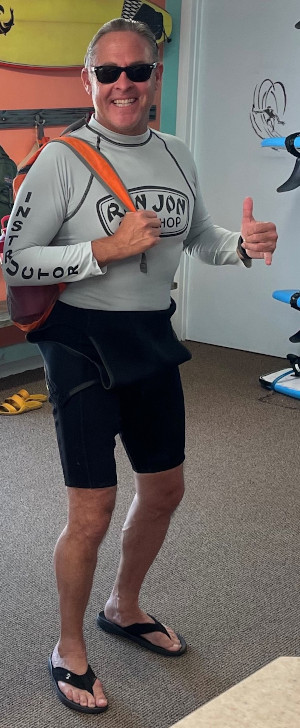Since he first stepped onto campus more than 35 years ago, David Horna believes George Mason University helped put him on a path to success.

Or, more appropriately, a wave of success.
A 1994 graduate with a bachelor’s degree in health sciences from the College of Education and Human Development, Horna can be found these days in sunny Cocoa Beach, Florida, teaching surfing lessons. Big Wave Dave, as he is known to patrons and students at Ron Jon’s Surf Shop, credits his current occupation to his experience at George Mason.
“Being a surf instructor is one of the best gigs you can get in surfing,” Horna said in a phone interview between surf lessons. “What put me at the top of the list was having a George Mason BSEd. You can see the thread of George Mason in not just the education I got, but how it opened doors [for me].”
Horna grew up in nearby Clifton, Virginia, and spent many of his summers competing in boogie board contests in Virginia Beach and Ocean City, Maryland. So, finding him in the ocean these days is not surprising.
Inspired by his mother, who was a third-grade teacher at several schools in Fairfax and Prince William counties, Horna attended George Mason as a commuter student and fondly recalls building friendships while working out at the fitness center on campus. His curriculum and professors at George Mason also left a lasting impression on him.
While still a student, he served as a guest expert at WJFK Radio (106.7 FM) in Washington, D.C., where he was on a modern exercise panel with an Air Force colonel and a George Washington University professor who chaired a research center. This segment sparked Horna to pitch to his health sciences professors on the idea of fulfilling his internship requirement at the radio station, where he worked on former FBI agent G. Gordon Liddy’s show.
“George Mason was creative enough and open minded enough to give me an opportunity,” he said. “They said, ‘Why don’t you pitch us? Tell us why and how this fits in with health sciences.’ I said, ‘I’m going to create a health segment for the show.’”
His dip into media led him to his first job with then-start-up E&E (Environment and Energy) News. The publication, which covered policy, government, environment and energy, and business development, began with just six reporters before reaching a newsroom of 65 across the world when it was acquired by Politico in 2020.
Horna started as an account executive, and by 2009, he had become a partner in the firm and was at a crossroads in his career. He was proud of the company he had helped build but was ready for a new challenge.

“I wanted to do something for me, for my soul,” he said. “I wanted to surf big waves.”
Horna moved to Puerto Rico and spent the next six years surfing, training, and practicing yoga while also working as a sales consultant and freelance writer for several publications. During that time, he spent six months in Hawaii, surfing the legendary North Shore in Oahu. He also made surfing excursions to Ireland, France, and California.
For nearly a decade, Horna has lived in Cocoa Beach, just five miles south of Cape Canaveral Space Station. Through his consultant work with SOFX, a media and networking company focused on the special operations community, he met CEO Sam Havelock Jr., a retired Navy SEAL. Havelock, who was also a surf instructor, suggested to Horna that he look into teaching.
Since 2022, Horna has taught private lessons five days a week, in addition to helping at surf camps and working in Ron Jon’s Surf Shop on the weekends. He has had students as young as 5 and as old as 70.
One of his proudest moments was helping a 16-year-old who had just one arm due to a birth defect. By the end of the two-hour lesson, the teenager was up on the board and riding waves. “He was so stoked. I was so stoked. You can’t write me a paycheck big enough to see that guy’s smile,” Horna said. “Surfing makes people’s lives better. It’s healthy, it’s therapeutic. I get to be the person who helps somebody find that.”
Horna believes George Mason opened the door to his surf instructing job, too. When he interviewed for the position, his supervisor was intrigued by his degree in health sciences. Through his education Horna knows, for example, the role that dorsiflexion—the backward bending and contracting of the foot or hand—plays in the placement of the toes in the “ready position” on the surfboard.
“It is one of the most crucial things because when they are in that position, they’ll glide into the waves,” Horna said. “You want to have everybody ready because everything happens so fast out there. It’s my job to get them ready.”
And he proudly displays his alma mater when in the water, often wearing a gray George Mason shirt during lessons. “I want people to know that they’re getting instruction from a George Mason University graduate,” he said. “I take a lot of pride in that. The school did a lot for me.”
Related News
- June 12, 2025
- June 11, 2025
- June 6, 2025
- June 2, 2025
- June 2, 2025
